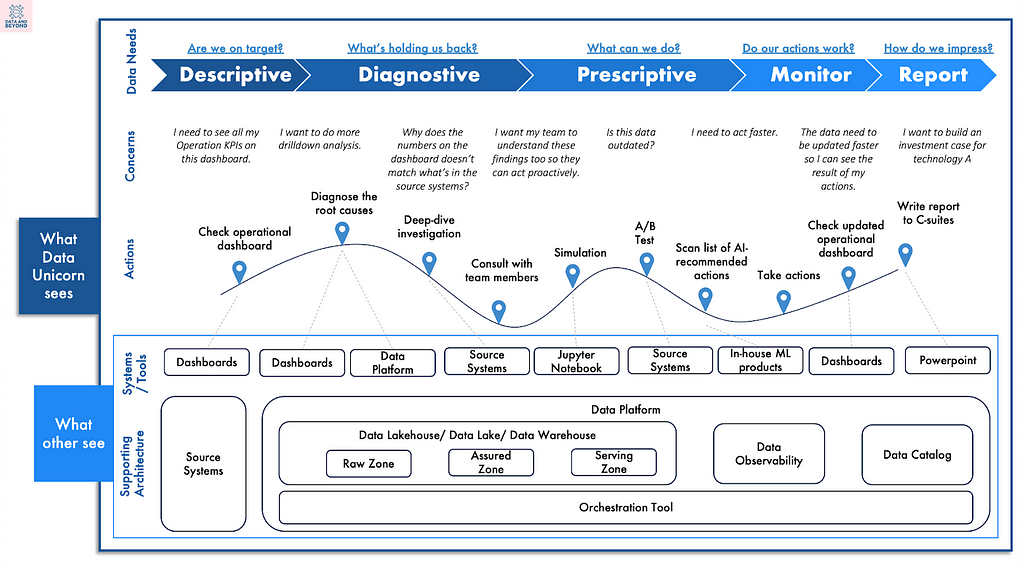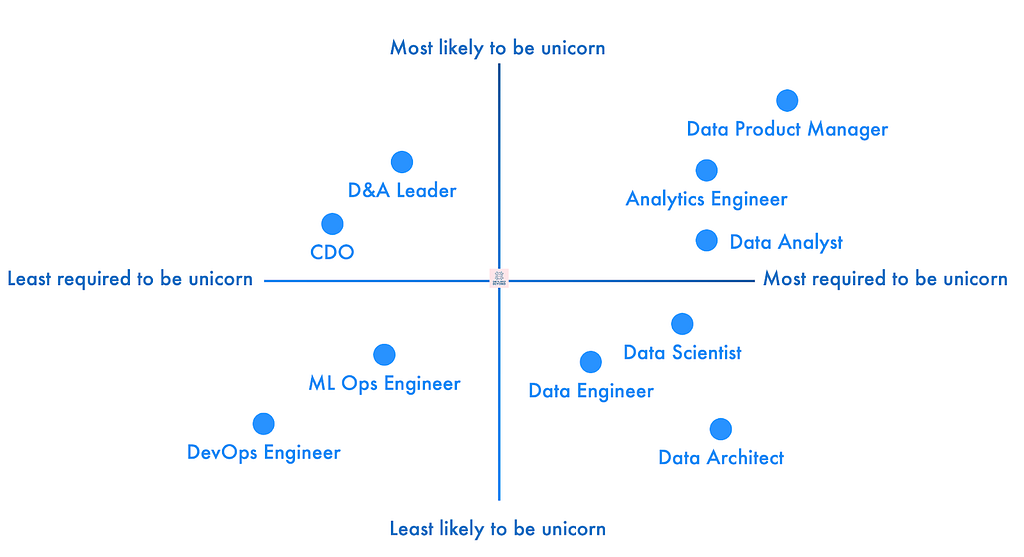
A view on Data Unicorns, why they are important and how to find them.

The data world is still developing and expanding everyday. With developing domains, there often are unclear, ambiguous concepts. Among all of them, there is a special concept that I’d like to examine further, merely due to its mystical nature yet majestic aura: the Data Unicorn.
Let’s have a look at Data Unicorn definition across the internet to have a taste at how ambiguous they are:
“If you truly understand your stakeholders, you’ll become a data unicorn.” — Mo Villagran
“To me, a data unicorn would be someone who can tell a story with data which then creates clarity of understanding in what the insight is saying, and clarity in what action now needs to be taken” — Nick Milne
“Hillstrom deems these roles “super-humans”: unicorns who master business, marketing and technology.” — Lea Pica, Present Beyond Measure
I often heard the terms thrown around by people who want to express their admiration for a data superstar, their desire to find one, and also their pessimism from the belief that they are rare.
My instinct tells me that Data Unicorn can be better understood, defined and discovered — and I put myself to the task of proving that hypothesis. In this article, I’ll walk you through my thoughts on the nature of Data Unicorns, why they are important, and how to find them.
Spoiler alert: You can create Data Unicorns as well!
Who are they?
A Data Unicorn can be identified via the ways they contribute values to a data team. You can measure this contribution through the skills they possess, and the mindset they have.
In terms of skills, they speak both technical and business languages. They understand the core concepts, operational process and key obstacles of both sides. They are great at data storytelling and capturing business’ attention. They can also be an engineer and debug when needed, as they know how different technical components talk to each other. They can speak the language of a data scientist too. After all, they love numbers and are probably quite good at calculus and statistics. The super power of Data Unicorns is learning. They learn, absorb and systemise any domains, including business and technical ones.
Regardless of their official titles, Data Unicorns’ mindset is to focus on the solution-problem fit. They make sure the data solution address the business problem in the best way. They enjoy listening to business complaining about their hassle, or blushing about their ambitions. They live, laugh and cry together with business, and yearn for an elegant solutions to their problems. Data Unicorns are not just solution engineers, they have long fallen in love with the problems. The bigger, hairier, scarier the problems, the more Data Unicorns are interested and invested.
Sounds mystical, isn’t it? I don’t really think so. Later in this article, I’ll go deeper into where you can find more Data Unicorns. But first, let us look at a few examples of Data Unicorn in the shape of different data roles:
- The Data Analyst Unicorn is someone who, while creating the report for the board meeting, is conscious that not all leading indicators are required to be presented. The unicorn will just pick the most important charts, and leave a maximum of three bullet points per slide explaining why things are the way they are, using business language.
- The Data Scientist Unicorn is someone who, while creating a model to predict churn, is conscious of the marketing department using the output of the model for a retention campaign. The marketers want to send retention offers to the right customers, but also minimise offers taken by already happy customers. The Data Scientist Unicorn will choose the right balance between high-precision and high-recall, and partner with a finance or marketing analyst to test the model.
- The Business Analyst Data Unicorn is someone who, while officially sitting in a business department, is not shy from technical details when the operational dashboards are broken. They will come straight to the Data Analyst, and if necessary, the Data Engineers to figure out the data lineage, the metrics logic, and pinpoint what is breaking their dashboards. You cannot mislead the Business Analyst Data Unicorn with technical jargon, as while they may not know how it works in details, they can still spot architectural weaknesses and contradictions.
The difference between Data Unicorn and others, is that the Data Unicorn do not confine themselves to stay within their official domain (which is often technical). The Data Unicorn has a clear vision of the customer’s needs, the concerns they have and the actions they want to complete along the analytics journey. Data Unicorns see the connection between the product and the problem:

Why are they important?
With their cross-domain skills and interests, Data Unicorns demonstrate the most values in enhancing the product-market fit for your data solutions, starting from defining requirements. Anyone can create a generic list of requirements for a technical solution, especially when ChatGPT is just a keystroke away. But it takes a Data Unicorn to write a good requirements list that addresses just what it needs to address.
The standard requirement list is often not good enough, as there will often be technical knowledge gaps preventing business from articulating what they want, based on what they actually need. Business team will need someone to translate their pain points into a bespoke, concrete list of requirements. This is where the Data Unicorns come in. They will:
- Proactively get data and business people into one room
- Understand the structure and components of both the business problems and the data solutions
- Ask the right questions to translate business problems into bespoke, detailed data requirements
- Prevent over-engineering
Knowing what elements should be prioritised, and what questions to ask to come up with the appropriate details, requires a combined tech and business perspective of a Data Unicorn.
Besides their critical tasks of refining the requirements, Data Unicorn also is a star player in a few more areas:
When it comes to building metrics, Data Unicorn is able to look at the formula of the metrics and tell if they make sense, without completely relying on their business partners. While business stakeholders are great at their own domain, they may not be data-savvy enough to explain the metrics logic in accurate pseudocode, especially when the source system stores data in a way that requires multiple joins and window functions to arrive at the non-duplicated, latest snapshot of a population.
When it comes to product onboarding, Data Unicorn can communicate the limitations of their data solutions in business language, and guide business stakeholders to use the product. Instead of just taking every request to enhance the solutions, they propose the best product package given their resource constraints. Data Unicorn can avoid over-engineering and discover the opportunity to maximise the value of existing solutions.
Finally, Data Unicorns help the data team stay relevant and be influential by communicating impact in a business-friendly terms. Instead of saying: “The model has 15% precision for an audience of a thousand”, the Data Scientist Unicorn will say: “The model’s audience of 1000 customer is expected to yield 150 purchases, compared to only 5 purchases if the audience is randomly selected”. Read more about communicating as a data scientist here.
Where to find them?
Find existing Data Unicorns in your team
Assuming people in your data team should already possess good technical skillset, the best way to find data unicorns is to seek input from business departments. You can survey some business colleagues and check who in your team interact with them the most. You can also design an experiment, send your team out there in the business world to present, gather requirements, or collect insights and see how they survive.
It’s important to have a reasonable expectation when you do this test, or survey. Between attitude and performance, my measure of success is heavily weighted towards attitude. I will look for people who are excited, comfortable or have courage to step in a room full of people not speaking their language. After all, attitude is harder to change than skillset, and all Data Unicorns have to be really passionate about business problems.
Finding external Data Unicorns
Lea Pica briefly mentioned in her podcast that many Data Unicorns are already very high up in the Analytics and Digital Marketing Agency. I am not surprised. Marketing world have a very strong culture of being customers focused — it is the fundamental premise of the domain. At the same time, digital marketers can be technical to some extents, due to their day to day job of dealing with campaign optimisation, funnel conversions, and channel analytics. The field of Performance Marketing is built upon a developed data foundations, with many mature data sharing and data analytics providers. So, if you are looking for a Data Unicorn, try a customer-facing solution engineer in Digital Marketing or Performance Marketing.
Generally, when interviewing a potential candidate, you can spend a portion of the time asking about their past interactions with business stakeholders, and test how they can describe, deconstruct and analyse the problems in non-technical terms. You also want to look for their ability to recommend technical solutions that address specific business problems. I suspect candidates with Consulting background will do well in this section — do drive deeper and ask for concrete examples from any abstract concepts (or buzzwords) that they refer to. It’ll be fun, and rewarding.
Besides background, job titles can be a helpful indicator too. I think some roles do have the tendency to be more unicorn-like than the other, such as the Data Analyst, or the Analytics Engineer. Baked into the responsibilities of these roles are many business-oriented activities: requirement analysis, presentation, storytelling. While some other roles have been traditionally shaped to be more technical, like Data Engineer or especially DevOps Engineer. You can use the Data Unicorn quadrant below as a starting point:
Tool: The Data Unicorn quadrant (*)

(*) — While I think each role here is in the right quadrant, the exact position of a role on this plot is speculative and based on a very small sample. I would suggest to use it as a starting point only, and twitch the plot based on your observations.
How to breed them?
Unlike the mystical nature of the name given to it, Data Unicorn is a skill stack that can be aquired. Mastering both tech and business language are achievable. Difficult, but achievable.
As a data leader, what you can do is to create the environment for your team to develop these skills. Create more touch points between tech and business. Send your team members on a field trip. Ask your engineers to shadow the end users. A helpful exercise for your team is to recreate this customer journey map below (Surprise surprise, this map also comes from the Marketing department):
Tool: Data Customer Journey Map

Another important thing to do is to create the motivation to become more unicorn-like. Many technical contributors are more comfortable with the binary world than the human world. They have little desire to understand the end user problems and rather entertain themselves with engineering challenges — their natural habitats. This mindset is often stemmed from a lack of awareness. With encouragement and rewards for unicorn-like behaviours, data leaders can foster a culture where it is not only cool to be a tech genius, but also cool to know why Mr A from Finance doesn’t find the new dashboard helpful, or why Mrs X from Logistics needs to refresh data every hour.
Most importantly, the approach is to not focus on one or two single individuals, but to build a Unicorn Data team. Despite the extreme case of the genius engineer who is too invested in cracking the Enigma code to talk to the Finance department, most data practitioners can, and should, be motivated to learn about the business problems. This strategy will result in activities that reinforce each other. Each team member is motivated by both their leader and colleagues, as now business problems are integrated in daily conversations within your team.
Conclusion
Data Unicorns are not imaginary creatures. They are also not innate abilities bestowed upon only a few. While rare, Data Unicorns can be found, they can also be bred in an encouraging environment. With an Unicorn-like team and their magnificent ability to integrate the Business and Tech world, you can maximise your product-solution fit, and become a much more integral part of the organisation.
Besides articles like this one, I also write a weekly newsletter — Data & Beyond Dispatch. Aiming to help data leaders extract the most value out of their data assets, every edition will bring you a piece of thinking wisdom, a strategic principle, an operational best practice and a success story from the Data industry. Subscribe if you want to make more impact with data!
Fantastic Data Unicorns and Where to Find Them? was originally published in Towards Data Science on Medium, where people are continuing the conversation by highlighting and responding to this story.
Originally appeared here:
Fantastic Data Unicorns and Where to Find Them?
Go Here to Read this Fast! Fantastic Data Unicorns and Where to Find Them?
